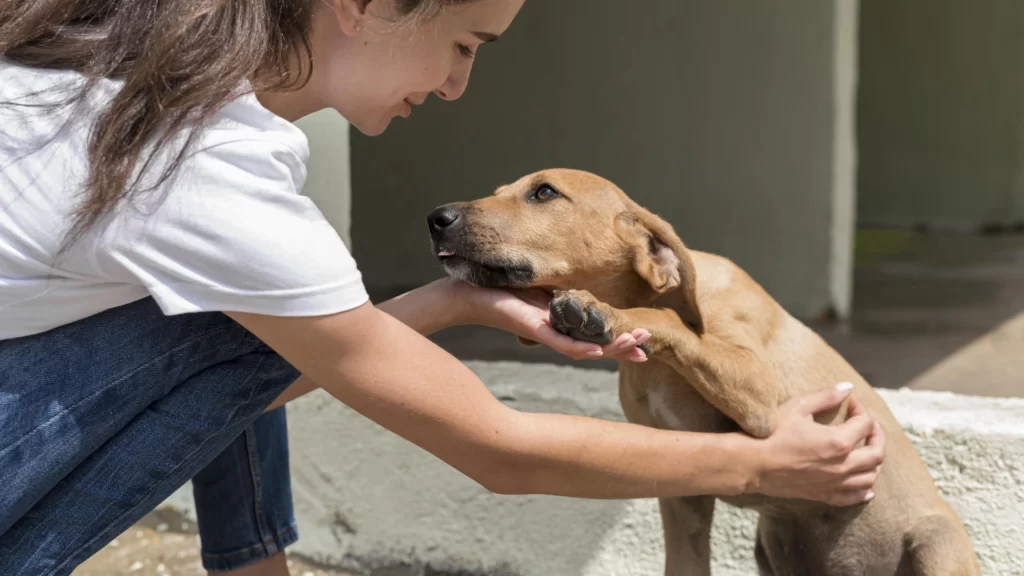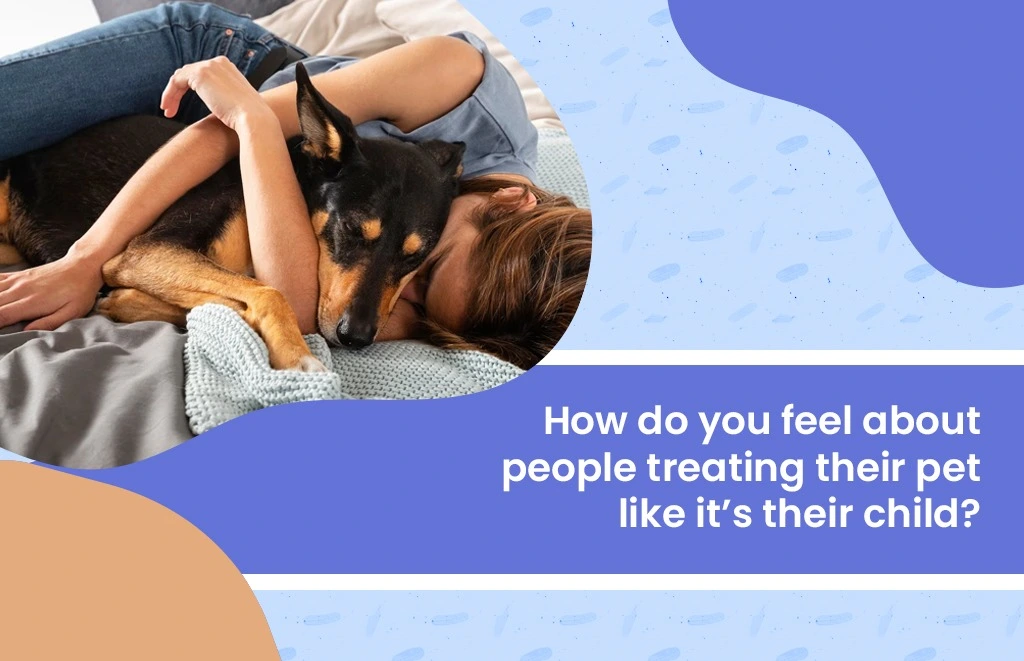How do you feel about people treating their pet like it’s their child?
Table of Contents
- Introduction
- The Rise of Pet Parenting
- The Emotional Connection
- Psychological Benefits
- The Parenting Experience
- Challenges of Pet Parenting
- Research and Studies
- Testimonials
- Critiques and Controversies
- Tips for Healthy Pet Parenting
- FAQs
- Conclusion
Introduction
Treating Your Pet Like a Child is the blog topic we have chosen today. As we know, pets are more than just animals; they are companions, friends, and family members. Many people treat pets like their children, giving them love, care, attention, and even gifts. But why do people do this? And what are the benefits of pet parenting for both humans and animals? Read this article for more knowledge about treating your pet like a child.
In this blog post, we will explore the rise of pet parenting, the emotional connection between pets and owners, the psychological benefits of having a furry friend, the challenges and joys of pet parenting, the research and studies on human-animal relationships, the testimonials from pet parents, the critiques and controversies around this phenomenon, and some tips for healthy pet parenting.

The Rise of Pet Parenting
Pet parenting is not new but has become more popular and visible in recent years. The American Pet Products Association (APPA) conducted a survey in which 67% of U.S. households own a pet, up from 56% in 1988. Moreover, 95% of pet owners consider their pets part of the family.
Many factors contribute to the rise of pet parenting, such as:
• Social and Demographic Changes: More people are living alone, delaying marriage and parenthood, or choosing to be child-free. Pets can provide these individuals companionship, emotional support, and a sense of purpose.
• Cultural Influences: Media, celebrities, and social media platforms have increased the visibility and popularity of pets. Many people share photos and videos of their pets online, creating a community of pet lovers and influencers.
• Economic Opportunities: The pet industry has grown significantly in the past decades, offering various products and services for pets and owners. From food and toys to grooming and health care, there is something for every pet’s need and preference.
• Scientific Advances: Research has shown that pets can positively affect human health and well-being, such as reducing stress, lowering blood pressure, improving mood, and enhancing social skills. Pets can also help people cope with loneliness, depression, anxiety, trauma, and chronic illness.
The Emotional Connection
One of the main reasons why people treat their pets like their children is because they feel a strong emotional connection with them. Pets can offer their owners unconditional love, loyalty, affection, and comfort. They can also express their personality, emotions, and preferences through behaviour and body language.
Many pet owners use parent-child relational terms to describe their relationship with their pets. They may call themselves “mom” or “dad” to their pets or refer to them as “fur babies” or “furry kids”. They may also celebrate their pets’ birthdays, buy them gifts, dress them up, or take them on vacations. These practices are not just superficial or silly; they reflect the deep bond that pet owners have with their pets.
According to a study by researchers at the University of Veterinary Medicine Vienna (Vetmeduni Vienna), pet owners show similar brain activity when they see photos of their pets as when they visit pictures of their children. The study also found that pet owners have higher levels of oxytocin – a hormone that promotes social bonding – when interacting with their pets than with strangers.
Psychological Benefits
Having a pet can have many psychological benefits for both humans and animals. Some of the benefits include:
• Reduced Stress: Pets can help people relax and cope with stressful situations by providing a source of comfort and distraction. Interacting with pets has been demonstrated in studies to reduce cortisol levels – a hormone associated with stress – and increase endorphins – chemicals that produce feelings of happiness.
• Improved Mood: Pets can make people smile and laugh with their antics and expressions. They can also provide emotional support and companionship for people who are feeling sad or lonely. According to studies, having a pet can help with anxiety and depressive symptoms.
• Enhanced Social Skills: Pets can help people improve their social skills by facilitating communication, interaction, and empathy. Pets can act as social catalysts or icebreakers that attract attention and initiate conversations. They can also help people develop trust, cooperation, and responsibility through caring for them. Studies have shown that pet ownership can increase social capital – the network of relationships providing resources and support – among individuals and communities.
• Increased Self-Esteem: Pets can help people boost their self-esteem by giving them a sense of achievement, purpose, and belonging. Pets can also provide positive feedback and unconditional acceptance for their owners. Research also indicates that owning a pet can improve self-confidence and self-image.
• Enhanced Cognitive Function: Pets can help people stimulate their cognitive function by engaging them in mental activities such as learning, memory, and problem-solving. Pets can help people prevent or delay cognitive decline by providing mental stimulation and social interaction. According to studies, having a pet can enhance cognitive function and lower the risk of developing dementia.

The Parenting Experience
Pet parenting is not just about providing pets with basic food, water, shelter, and health care needs. It is also about creating a nurturing environment that fosters pets’ physical, mental, emotional, and social development. Pet parenting involves:
• Training: Teaching pets the rules and expectations of living with humans, such as housebreaking, obedience, manners, and tricks. Training can help pets learn new skills, prevent behavioural problems, and strengthen their bond with their owners.
• Playing: Engaging pets in fun and stimulating activities that suit their personality, energy level, and interests. Playing can help pets exercise their body and mind, release stress, and have fun with their owners.
• Grooming: Taking care of pets’ hygiene, appearance, and comfort by brushing their fur, trimming their nails, cleaning their ears, bathing them, and checking for parasites. Grooming can help pets stay healthy, prevent infections and diseases, and enhance their well-being.
• Bonding: Spending quality time with pets by cuddling, talking, petting, or massaging them. Bonding can help pets feel loved, secure, and happy with their owners.
Challenges of Pet Parenting
Pet parenting can be challenging and glamorous. It can also pose some challenges and difficulties for both humans and animals. Some of the challenges include:
• Cost: Owning a pet can be expensive, especially regarding veterinary care, food, supplies, grooming, boarding, training, and insurance. According to the APPA, the average annual cost of owning a dog is ₹1,14,565.69 rupees, and the average yearly cost of owning a cat is ₹75,326.32. These costs can vary depending on the pet’s size, breed, age, and health condition.
• Time: Owning a pet can be time-consuming, especially when feeding, walking, playing, training, grooming, and cleaning up after them. According to a survey by Rover.com, the average dog owner spends about 50 minutes per day on dog-related activities. These activities can interfere with other obligations or plans of the owner.
• Responsibility: Owning a pet can be a big responsibility that requires commitment, dedication, and patience. Pet owners must ensure that their pets are well-cared for at all times and do not cause harm or inconvenience to others. Pet owners also have to deal with problems or issues with their pets, such as accidents, illnesses, injuries, or behavioural issues.
• Lifestyle: Owning a pet can affect the owner’s lifestyle in various ways. Pet owners may have to adjust their schedule, travel plans, living space, social life, or career choices to accommodate their pets’ needs and preferences. Pet owners may also face some challenges or conflicts with their family members, friends, neighbours, landlords, or employers regarding their pets.
Research and Studies
A growing body of research and studies explores the phenomenon of pet parenting from different perspectives, such as anthropology, psychology, sociology, biology, and economics. Some of the research topics include:
• The history and evolution of human-animal relationships
• The cultural and social factors that influence pet ownership and pet parenting
• The biological and psychological bases for the emotional bond between owners and their pets
• The effects of pet parenting on human health, well-being, cognition, personality, behaviour, and social relationships
• The effects of human parenting on pet health, well-being, cognition, personality, behaviour, and social relationships
• The similarities and differences between human parenting and pet parenting
• The ethical and moral implications of pet parenting
• The economic and environmental impacts of pet parenting

Testimonials
Many pet parents share their stories and experiences living with their furry children online or offline. They express their love, joy, gratitude, pride, sorrow, or frustration for their pets through various media such as blogs, podcasts, videos, books, magazines, or social media platforms. Here are some examples of testimonials from pet parents:
a) “I love my dog more than anything in this world. He is my best friend, my confidant, my therapist, my exercise buddy, my alarm clock, my protector, my teacher, my inspiration, my soulmate. He makes me laugh every day with his antics and expressions. He comforts me when I’m sad or stressed. He listens to me when I need to vent. He celebrates with me when I achieve something. He supports me when I face challenges. He loves me unconditionally and accepts me for who I am. He is my child, and I am his mom. He is the best thing that ever happened to me.” – Jessica, a dog mom of a golden retriever named Max.
Critiques and Controversies
Not everyone agrees with or approves of pet parenting. Some people criticize or question the phenomenon of treating pets like children for various reasons, such as:
• Anthropomorphism: Some people argue that pet parenting is a form of anthropomorphism – attributing human characteristics or behaviour to non-human entities. They claim that pet parenting is unnatural, unrealistic, or disrespectful to animals, ignoring or denying their true nature, needs, and instincts. They suggest pet owners should respect their pets as animals, not humans.
• Narcissism: Some people argue that pet parenting is a sign of narcissism – a personality disorder characterised by excessive self-love, self-importance, or self-centeredness. They claim that pet parenting is selfish, immature, or insecure, reflecting pets’ need for validation, attention, or control. They suggest that pet owners should focus on their own personal growth, relationships, or responsibilities, not on their pets.
• Consumerism: Some people argue that pet parenting is a product of consumerism. This social and economic system promotes the acquisition of goods and services in ever-increasing amounts. They claim that pet parenting is wasteful, excessive, or harmful to the environment, as it involves buying unnecessary or dangerous pet products or services. They suggest that pet owners should reduce their consumption, reuse their resources, or recycle their waste for the sake of their pets and the planet.
• Childlessness: Some argue that pet parenting results from childlessness – being without children by choice or circumstance. They claim that pet parenting is a substitute, compensation, or escape from having children. They suggest pet owners should have children instead of pets or adopt children needing a home.
Tips for Healthy Pet Parenting
Pet parenting can be a rewarding and fulfilling experience for humans and animals if done healthily and balanced. Here are some tips for healthy pet parenting:
• Know Your Pet: Learn about your pet’s species, breed, age, temperament, behaviour, health, and needs. Understand your pet’s personality, preferences, likes, dislikes, strengths, weaknesses, quirks, and habits. Appreciate your pet’s uniqueness and individuality.
• Respect Your Pet: Treat your pet with kindness, dignity, and compassion. Do not abuse, neglect, exploit, or manipulate your pet. Do not impose your expectations, desires, or beliefs on your pet. Please do not force your pet to do something they do not want to do or are not comfortable with. Do not compare your pet to other pets or humans.
• Care For Your Pet: Provide your pet with food, water, shelter, and health care. Make sure your pet is in a stimulating, cosy, and safe environment. Give your pet enough exercise, play, grooming, and bonding time. Protect your pet from harm, danger, or illness. Seek professional help if your pet has any problems or issues.
• Love Your Pet: Show your pet affection, attention, and appreciation. Express your feelings for your pet verbally or non-verbally. Reward your pet for good behaviour or achievements. Comfort your pet when they are sad or scared. Support your pet when they face challenges. Celebrate your pet’s milestones or special occasions.

FAQs
Why do people treat their pets like children?
There is no single answer to this question, as people may have different motivations and experiences of treating their pets like children. Some possible reasons are:
- They have a strong emotional attachment to their pets and consider them part of their family.
- They cannot have or do not want human children and find fulfilment and joy in caring for an animal.
- They have experienced trauma, loss, or loneliness, and they find comfort and healing in their pets.
- They enjoy the companionship, fun, and affection that their pets provide.
- They appreciate their pets’ positive effects on their physical and mental health.
Is it bad to treat your pet like a child?
Treating your pet like a child is okay if it does not harm the pet or the owner. Pets can provide many benefits to their owners, such as companionship, unconditional love, emotional support, and physical activity. However, owners should also respect the needs and preferences of their pets and not impose human expectations or behaviours on them. For instance, some pets may not enjoy being dressed up in clothes or being hugged too tightly. Owners should also ensure their pets receive proper veterinary care, nutrition, training, and socialisation.
How can you treat your pet like a child without spoiling them?
Treating your pet like a child does not mean you must spoil them or let them do whatever they want. You can still show your love and care for your pet while setting boundaries and rules for them. Some tips are:
- Avoid overfeeding or giving your pet too many treats, and instead, provide them with a balanced diet.
- Train your pet with positive reinforcement and avoid harsh punishments or scolding.
- Teach your pet basic commands and manners, such as sit, stay, come, and leave.
- To keep your pet healthy and happy, provide ample mental and physical stimulation.
- Reward your pet with praise, attention, and playtime when they behave well.
What are some signs that you are treating your pet like a child?
Some signs that you are treating your pet like a child are:
- You refer to your pet as your baby, son, daughter, or other parental terms.
- You celebrate your pet’s birthday, holidays, or milestones with gifts, cakes, or parties.
- You dress up your pet in clothes, accessories, or costumes.
- You take your pet everywhere, such as shopping, travelling, or dining out.
- You buy your pet expensive or luxurious items, such as toys, beds, or furniture.
- You talk to your pet as if they can understand you or respond to you.
- You share photos or videos of your pet on social media or create accounts for them.
How does treating your pet like a child affect your relationship with others?
Treating your pet like a child can positively or negatively affect your relationship with others. On the one hand, treating your pet like a child can help you bond with other people who share a similar passion for animals. You can also make new friends or join communities with other pet parents. On the other hand, treating your pet like a child can alienate or annoy some people who do not understand or appreciate your lifestyle. You may also face criticism or judgment from people who think you are wasting your time or money on your pet.
How does treating your pet like a child affect your relationship with yourself?
Treating your pet like a child can positively or negatively affect your relationship with yourself. On the one hand, treating your pet like a child can boost your self-esteem, happiness, and well-being. You can also develop skills and qualities such as empathy, responsibility, and patience. On the other hand, treating your pet like a child can cause you stress, anxiety, or guilt. You may also neglect your needs or interests in favour of your pet.
How does treating your pet like a child affect the behaviour of your pet?
Treating your pet like a child can positively or negatively affect your pet’s behaviour. On the one hand, treating your pet like a child can make them feel loved, secure, and confident. They can also learn how to trust and communicate with you and others. On the other hand, treating your pet like a child can make them spoiled, dependent, or aggressive. They may also develop behavioural problems such as separation anxiety, barking, chewing, or biting.
How can you balance treating your pet like a child and respecting their animal nature?
Treating your pet like a child does not mean that you have to ignore or deny their animal nature. You can still respect and appreciate their natural instincts and behaviours while providing them with love and care. Some ways to balance treating your pet like a child and respecting their animal nature are:
- Learn about the unique requirements and personality traits of your pet’s breed, species, or personality.
- Provide your pet with appropriate outlets and environments for their natural behaviours, such as scratching, digging, or hunting.
- Allow your pet to interact and socialise with other animals of the same species or that are compatible.
- Respect your pet’s body language and signals, and do not force them to do something they do not want.
- Recognise and accept the limitations and differences between your pet and a human child.
How can you cope with the loss of your pet if you treat them like a child?
Losing a pet can be painful and challenging, primarily if you treat them like a child. You may experience grief, sadness, anger, or guilt. You may also feel lonely or empty without your pet. Some ways to cope with the loss of your pet are:
- Allow yourself to mourn and express your feelings. You can cry, write, talk, or pray.
- Seek support from your family, friends, or other pet parents who understand what you are going through.
- Cherish the memories and celebrate the life of your pet. You can create a memorial scrapbook or donate to a cause in their name.
- Take care of yourself and your health. You can eat well, sleep well, exercise, or meditate.
- Consider getting another pet when you are ready. You can adopt, foster, or volunteer with animals.
How can you help others understand why you treat your pet like a child?
Treating your pet like a child may only be understood or accepted by some. Some people may have different views or values about animals and their role in society. Some people may also have different experiences or expectations of parenthood and family. Some ways to help others understand why you treat your pet like a child are:
- Explain your reasons and feelings for treating your pet like a child. You can share your stories, goals, or benefits of pet parenting.
- Respect their opinions and perspectives, even if they differ from yours. You can agree to disagree or find common ground with them.
- Educate them about the facts and research on pet parenting. You can show them the scientific evidence or statistics on the benefits of pet parenting.
- Invite them to meet or spend time with your pet. You can let them see how happy and healthy your pet is.
Conclusion
Pet parenting is a phenomenon that involves treating pets like children. It has become more popular and visible in recent years due to various factors such as social changes, cultural influences, economic opportunities, and scientific advances. Pet parenting can benefit humans and animals, such as reduced stress, improved mood, enhanced social skills, increased self-esteem, and enhanced cognitive function. Pet parenting can pose challenges and difficulties, such as cost, time, responsibility, and lifestyle. Pet parenting can generate critiques and controversies, such as anthropomorphism, narcissism, consumerism, and childlessness. Pet parenting can be a healthy and balanced experience if done with knowledge, respect, care, and love.

